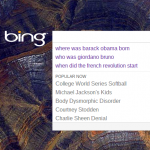Google Jelly Bean smokes Apple Siri

A week has passed since I started up my Google I/O-issue Galaxy Nexus and updated to Android 4.1 (aka Jelly Bean). Since then, my daughter and I faced off Google's Voice Assistant against Siri (on her iPhone 4S). The results aren't surprising. Google's depth as a search provider proves its wherewithal against Apple, which calls Siri a personal assistant. But Jelly Bean's feature, used alongside Google Now, is every bit more and every bit what a digital assistant should be. Siri sucks even more, by comparison.
I will be absolutely clear: Together, Voice Assistant and Google Now represent a watershed development, living up to what Apple promises with Siri. Google has successfully presented its depth of search in a truly meaningful manner -- one that can change how people interact with mobile devices. If execution improves over time, particularly as Google Now learns personal habits, these innovations could be as important to the search giant as the development of its algorithm.
Microsoft ad and search biz is a $6.2B failure

Worthless. That's the description that best describes Microsoft's ambitious aQuantive acquisition, announced in May 2007. Today, after the market closed, the software giant announced a "non-tax-deductible income statement charge" of $6.2 billion booked last year. Fiscal 2012 closed June 30, so the timing has a deliberateness.
Microsoft probably should have told everyone before the quarter's close. Doing so today, during a big holiday week (Fourth of the July), mitigates the negative news. Lots of people are on vacation.
Liveblog from Google I/O -- it's insanity

I'm here in San Francisco, undeterred by cancelled and delayed flights, and it's madness. At 7 am PDT, when the doors were supposed to open, the line wrapped around and down the block and around the next one. Man, you should have come. I/O closes an exciting month of developer events -- Apple's WWDC, Microsoft's TechEd, Windows Phone and surprise Surface announcement. But the last word goes to Google, which is expected today to debut the Nexus tablet, expand cloud services and delight with lots more. I'm too rushed to go through them all.
The keynote commences at 9:30 am PDT -- that's 12:30 pm Eastern Time, and all updates here will be in chronological order reversed -- meaning newest first. You'll want to refresh often.
Google stands against government spying and censorship

Google's fifth "Transparency Report" shows that the emperors of the world wear no clothes. The search and information giant started releasing the data two years ago, offering a small peek into the bombardment of user information requests that world governments make -- everything from non-copyrighted YouTube video take-downs, to search result link removals, to, most alarmingly, private citizen emails and information.
But what is most alarming about these requests? Many are not even for serious matters of national security. Most are down right requests to silence, censor, track, and or monitor dissident internal political groups and political opponents. In some, it is the outright censorship of non-violent organizations, ideas, or even the requested silence of whistle-blowers pointing out corruption. Google's own policy analyst, Dorothy Chou, sees a disturbing trending rise, particularly from "Western democracies not typically associated with censorship".
Get back, Siri, Bing Britannica answers questions

For as long as Microsoft has offered a search engine, CEO Steve Ballmer or one of his minions has talked about the goal of providing answers to real questions rather than forcing people to use keywords. The success of social search service Quora or Yahoo Answers shows how much people simply want to ask. Bing and Google handle questions much better today than ever, but often the answers come unqualified and without the depth or authority of, say, a peer-reviewed encyclopedia. Apple tries with Siri on iPhone, with Wolfram Alpha behind it. But we all know that, for now, Siri sucks.
Today, Microsoft seized the answer search initiative, by incorporating Encyclopedia Britannica into Bing results. Sure Google places Wikipedia front and center, but Britannica is an undisputed, reliable authority -- well for anyone old enough to have owned a set of the books. Ask a question. "The answer provides a quick overview of the subject, a thumbnail image, and useful facts and figures making it easier than ever to get trusted content in search", Franco Salvetti, Bing principal development lead, explains. "We also pull in direct links to other trusted sources".
Google Search gets big iOS makeover

Google is the go-to search engine for most people, so the existence of a dedicated mobile app should come as no surprise. There has been a tool available for iOS for some time but the release of Google Search 2.0 sees the introduction of a completely redesigned app that not only boasts a new interface and new features, at least if you have an iPhone, but also easier access to other Google searches such as Gmail, Docs and Calendar.
As before, it is possible to conduct searches by typing, using your voice or taking a photo with your camera and using Google Goggles. There have been improvements made to the speed of autocomplete suggestions so you should find that results are available faster than ever and you can take advantage of a preview pane that slides in from the side to view individual page results. Switching between search results and pages takes nothing more than a swipe, and this gesture can also be used to switch search modes, such as moving between a standard search and an image search.
Who says Google promotes piracy?

Perhaps the question should be: Who doesn't? Google search is a powerful tool for finding content of any kind, including copyrighted material posted without permission. Today Google sets the record straight, by releasing the URLs copyright holders request removed from search: 1,246,713 over the last month. These came from more than 1,000 copyright holders directed at about 24,000 domains.
Apparently more details about other copyright areas will come later. For now, search is priority, with Google planning to update requests daily. The report available on Wednesday offers data through yesterday.
Microsoft Socl opens to all, the social network where search queries = status updates

Microsoft on Monday opened its experimental social search service called So.cl, which lets users socially broadcast their search queries and attached results. Socl is the product of Microsoft's Fuse labs, and has been open to limited user groups at the University of Washington, Syracuse University, and New York University, for the last five months.
Unlike the recent revamp of Bing, which integrates a user's social graph into their search base, Socl is something entirely different. The new service combines the "social broadcasting" aspect of Twitter and applies it to search queries and research.
Amazon out-searches Google

Amazon set its sights on Google Thursday by introducing CloudSearch, a feature that allows customers of its Amazon Web Services offering to implement search capabilities to their websites. The technology behind CloudSearch is the same that Amazon uses on its retail site.
Access is billed based on the number of running search instances, anywhere from 12 cents to 98 cents per hour, with a 98 cent per gigabyte charge for the storage of search data. Running continuously, the search functionality could cost as little as $90 per month, and in some cases a cheaper alternative to Google's Site Search offering.
Google+ makeover is much more than a pretty face

Just as Facebook forces users to adopt a more cluttered, confusing appearance, Google+ simplifies and provides social networkers more control over the layout. Much as I've tried to use Facebook more, because that's where my family hangs out, Google+ is inescapable. It's a gravity well too strong to resist. For 170 million, the number of users Google revealed today, Plus perhaps is irresistible, too. That's a lot of people for a service less than a year old.
Google+ is more than a social network. It is the future of Google. Like it or not, the company has embarked on a strategy around social search, and Plus is a pillar. Competing against Facebook clearly is one of Google's goals. But there also is realistic appraisal that social is the web's future -- and why shouldn't it be with gregarious humans? Additionally, Google+ is the sun around which the company's other products will revolve -- even search -- defining a digital lifestyle empowering connections, communications and commerce.
Bing Desktop is beautiful and annoying

Last week, Microsoft quietly released a public beta of Bing Desktop, a toolbar that brings Bing searches to your desktop (as long as it’s Windows 7, at least -- the program isn’t available for earlier versions of Windows).
And if that’s not quite enough to interest you, then the program can also double as a wallpaper changer, with its option to download and use the daily Bing image.
Google, there's no good 'without doing evil'

When will someone stand up to the bully in the room? He roves around in intimidating manner boasting how kind he is. Hey, he can make friends without being evil. But bully is anything but good. That's how I feel about Google this fine Spring day.
Yesterday, "Google Play", the renamed Android Market, popped up on the black bar adorning my Google search page, with a beaconing red -- or is it orange -- "New". The service is now front and center with other Google services hawked from search, spotlighting an ongoing trend of aggressive integration that has rapidly accelerated under Larry Page's leadership. Microsoft spent nearly a decade under house arrest for doing less.
Bing Maps is lost on the Internet

Is Microsoft's Bing having a meltdown? One of my colleagues just alerted me to troubles accessing Bing Maps. He gets an error message, as do two other BetaNews staffers. We're located in different parts of the country using various cable or DSL services. This is not a localized problem.
The outage appears to be broader than Bing Maps. I also can't get to Bing News, while someone else couldn't get Search, which works for me. Colleague Tim Conneally pinged Bing Maps while I wrote the first paragraph and got repeated timeouts. Are you having Bing troubles today?
What's behind Google's Charles Dickens doodle?

One of England's most celebrated authors was born 200 years ago today. Google is commemorating Charles Dickens with a little (Oliver) Twist. There's a doodle, as would be expected, but behind it links to free ebooks from the search and information giant's own bookstore. Eh, what's up with that? Is it favoritism?
That's a question I've heard often asked recently about Google, as the amount of cross-product, cross-service integration increases. The practice jumped quite dramatically after Larry Page returned as Google CEO in April 2011, and it's not abating. Favoritism should be a concern, given that impartiality -- and with it trust -- is crucial to Google's core product (search) and profit center (search ads and keywords). What the Dickens is going on here?
What is this mysterious site doing scanning mine?

For you Sherlock Holmes types out there, how would you like a case to crack?
As a software developer I have my own website, and l regularly track my web traffic. I check my web site stats daily. I do analysis of that data to glean everything I possibly can about those who visit my site. So to my surprise, one day recently while checking my web stats I was shocked to see the day's traffic shoot through the roof!
Recent Headlines
Most Commented Stories
BetaNews, your source for breaking tech news, reviews, and in-depth reporting since 1998.
© 1998-2025 BetaNews, Inc. All Rights Reserved. About Us - Privacy Policy - Cookie Policy - Sitemap.